Investigative Stories

Yograj Liwang, a 29-year-old resident of Jhapa, had been employed as a barista and a fruit decorator at the Oriental Coffee Shop in Dubai. He had been performing well at his job until October 2022, working 10 hours a day. Utilising the skills he learnt during his previous stint in Malaysia, Liwang earned a monthly pay of 2,830 dirhams (equivalent to more than hundred thousand rupees) in Dubai.

A network of human traffickers
While working in Dubai, Yograj came across an advertisement on a Facebook page titled 'Nepali in UAE'. An ad on the page read, "We are seeking a customer service worker with strong computer typing skills. Salary: One thousand US dollars."
Ruchan, a Nepali resident of Dubai, had been actively promoting the page to a substantial number of followers. Upon seeing the advertisement shared by Ruchan, Yograj reached out to him. (See message exchange between Ruchan and Yograj)
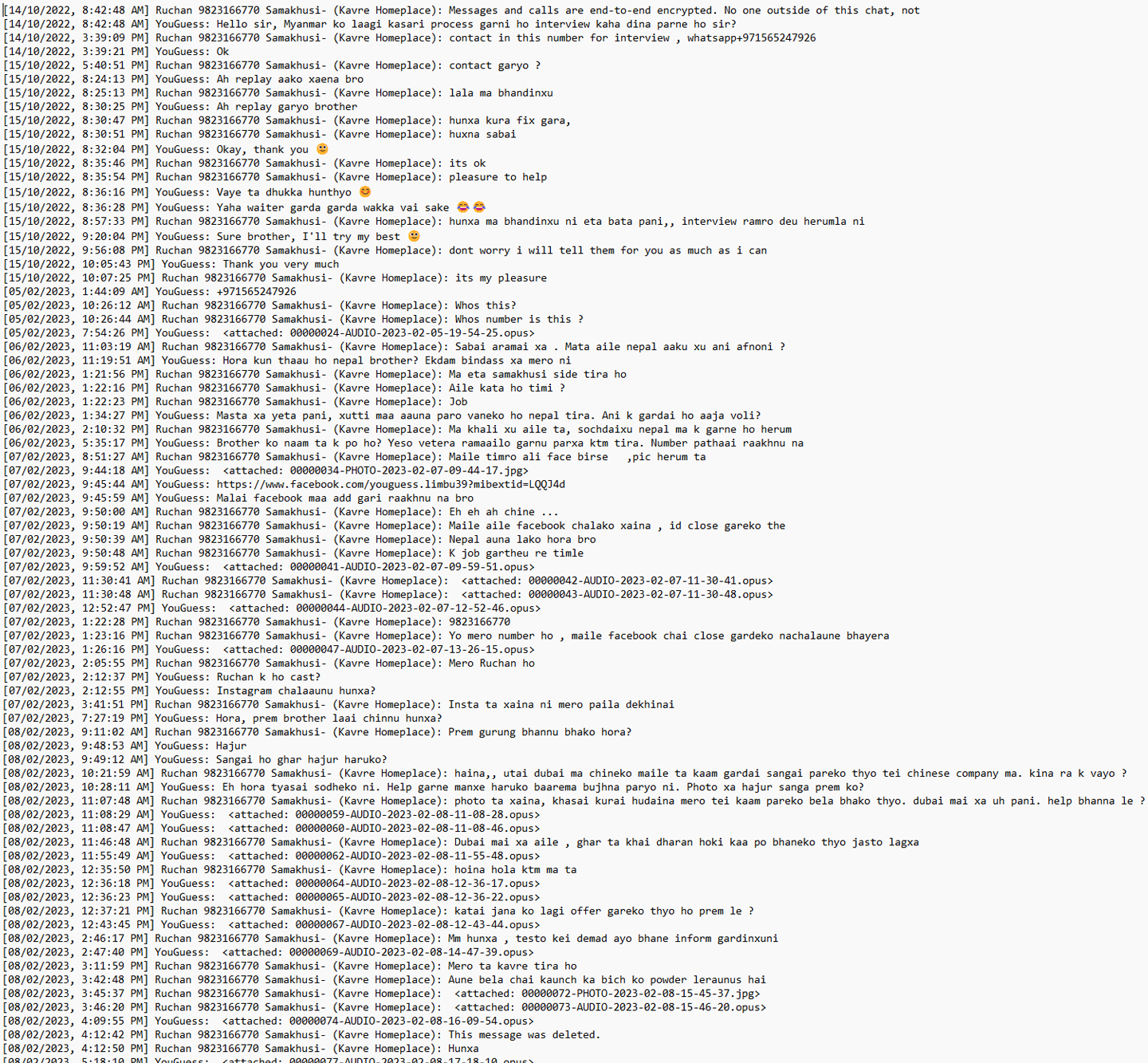
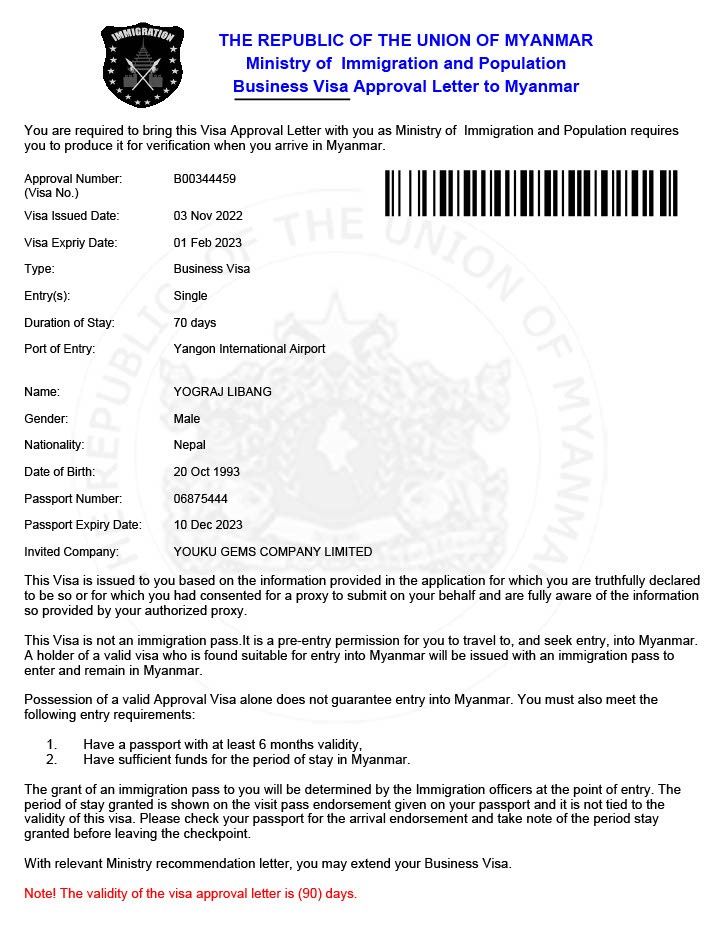
After participating in an online interview and practical test conducted by Yaku Gems Company Limited, Yograj was informed that the necessary air tickets, insurance, and hotel accommodations had been arranged for him. The company also arranged his visa, which was collected by an Indian citizen who contacted Yograj online. Yograj met the Indian citizen at Business Bay Train Station in Dubai to provide him his passport. The Indian man had refused to accept that Yograj would come to his office with his passport. Eventually, Yograj's passport was returned to him with a visa.
Yograj hasn’t yet met either of the two individuals, Ruchan and Prem Gurung, he connected with while applying for a job in Myanmar. Yograj stated that he only met the Indian citizen who facilitated his visa process when he collected his passport.
Destination Wang Mangtam
On November 18, Yograj departed from Dubai and arrived in Rangoon by plane. Upon arrival, he was greeted by individuals who brought him to a hotel called 'Ten Mile Hotel,' located approximately four kilometers away from the airport. He was confined there for four days until November 22, when two agents, who spoke Burmese and Chinese, arrived at the hotel and informed Yograj that a branch office of Yoku Gems Company Limited was located in Tachileik. Faujan, an Indonesian citizen who was also staying at the hotel, was also informed along with Yograj that they would be leaving for Kengtung to work in the Tachileik branch.
Yograj, who was promised a job in the Tachileik branch of Yoku Gems Company Limited, was taken to Wang Mangtum instead of the promised location after landing at Kengtung Airport. Wang Mangtam is approximately eight kilometers away from Mong Ya city near the Chinese border. Yograj and his companions traveled by motorbike, and boat to reach the location. Yograj described the experience of traveling to the distant place in the remote forest area that lacked even a telephone connection, as "harrowing."
In Myanmar's Northeastern Shan Province lies the Wa State, an area that includes the towns of Mipon and Mangtam and is controlled by the Wa rebels. The United Wa State Army, a rebel group, negotiated with the Myanmar military government to run an ethnic state in the region.
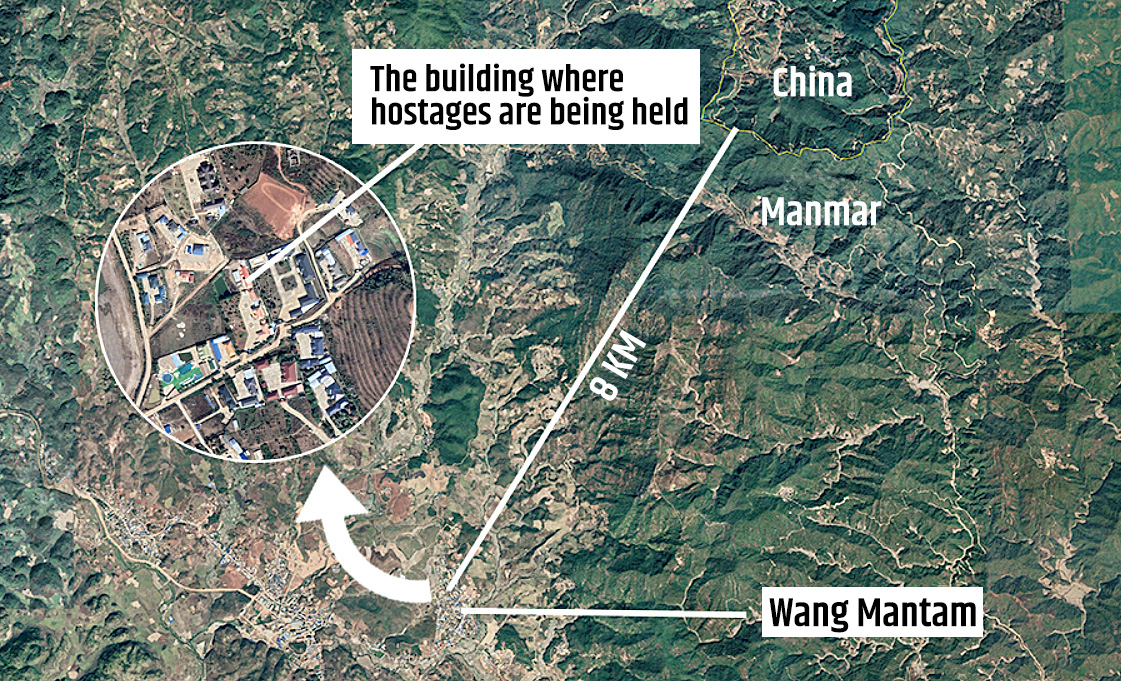
Yograj arrived at the location with Faujan on November 23rd. He met with the supposed employer, Chinese citizen Yong Zhao, in a villa near the rebel army camp that was referred to as an office. The villa was located in Wang Mangtam.
Yong Zhao promised to pay Yograj and Faujan one thousand US dollars per month and additional compensation for extra work, in exchange for establishing relationships with young people in various Asian countries through cryptocurrency and love scams. The initial meeting took place in Wang Mangtam, described as an office near a rebel army camp. Yong instructed them on using voice-changing software and other methods to extract money from their targets. The job was to target victims in Hong Kong, Malaysia, Singapore, Thailand, Taiwan, Japan, and Korea.
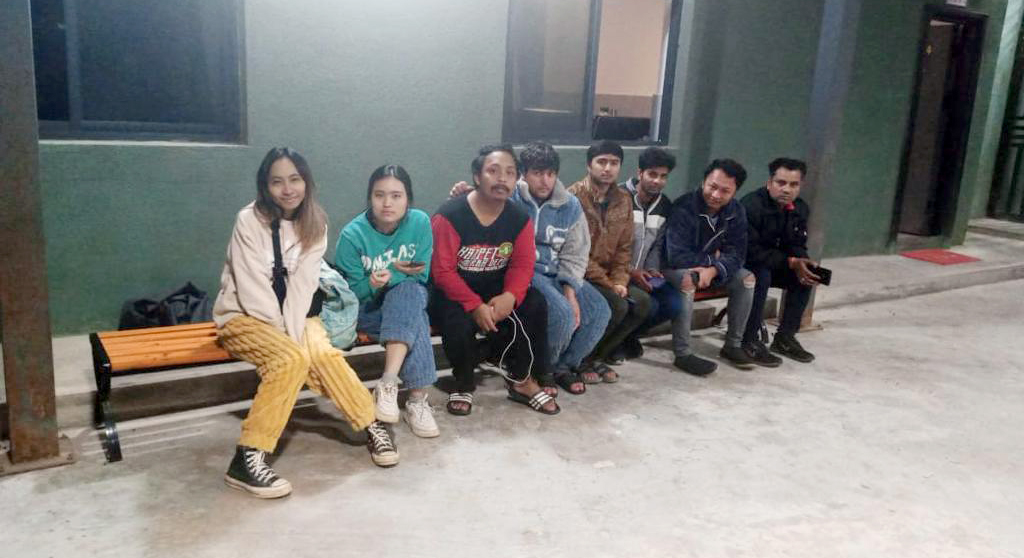
Ten days after Yograj and Faujan arrived in Wang Mangtam, two Indonesian girls, Innayah Salsabil and Madilini, also made their way to the destination. Joining them were Nirabh Barmotia from Gujarat and Mohanlal, Sheshnath, and Amit Kumar Prajapati from Uttar Pradesh, all of whom had come with aspirations of earning money to support their families. Among the group were engineers, drivers, and plumbers. They had all arrived at the same villa, hoping to turn their dreams into reality.

Yograj and his fellow captives were held hostage in the Wa province, an ethnic state located in Myanmar's Shan Province. The area is governed by the ‘United Wa State Army’, a rebel group that has been running an autonomous regime since 1988. Wa State is well-known for its poppy cultivation, which serves as the main source of income for the region. In addition to this, the area has gained notoriety for its gambling industry, which attracts wealthy individuals from China and Southeast Asia to its many casinos.
A Myanmar citizen who speaks Nepali claims that Chinese criminal organisations have turned the area into a hotbed of cybercrime under the guise of rebel groups. The source alleges that hundreds of individuals from Nepal, India, Indonesia, Malaysia, Laos, and Sri Lanka are being trafficked to the region to run various illegal enterprises through online means.
Yograj claimed that his group's main responsibility was to deceive individuals into depositing money into the company's account. However, their efforts to scam others proved to be challenging. Initially, Yong Zhou directed his IT team to focus on Asian countries, but later shifted their focus to Europe. Despite their attempts, Yograj and his group were unable to cheat anyone. In response to their lack of success, those attempting cybercrimes were subjected to torture. "All of us who were brought there were trying our best, but when our expected results did not materialise, we were punished," Yograj stated.
Nirav, who hailed from Gujarat, was horrified by the torture he endured and contacted the agent who had arranged for him to be sent to Myanmar, begging to be sent back home. This plea for help enraged Yong Zhou, who proceeded to tie up and beat the other workers. The captors told Yograj and others it reportedly cost $75,000 per person to transport them to Myanmar. Faced with the threat of having their kidneys sold if they failed to come up with the necessary funds, many of the workers, including Nirav, began planning their escape. This was no easy feat, as the villa where they were being held captive was surrounded by high walls and fences in the midst of a forest, with Chinese security personnel posted at all times.
Nirav Barmotia, who spoke out against the illegal activities and pleaded to be allowed to leave, was subjected to physical abuse and denied food. Barmotia came up with a plan to pay a ransom to escape. But the Chinese man demanded a ransom of $75,000. Barmotia, who was contacted by Center for Investigative Journalism, stated, "Eventually, it was agreed that I would be released for $20,000, with $10,000 to be paid upon leaving the camp and another $10,000 to be deposited into the owner's account upon reaching the Rangoon Airport."
In accordance with the agreed terms, Nirav's family sent 20,000 US dollars to Yong Zhao's account, which included the 10,000 dollars that was supposed to be given after reaching Rangoon airport. However, Zhao demanded an additional 10,000 dollars, claiming he would not release Nirav until he received it.
"Despite already paying 20,000 dollars, Yong Zhao began bargaining and demanded an additional 10,000 dollars, claiming he had spent a total of 75,000 dollars to bring Nirav to Myanmar," said Nirav, who endured 27 days of continuous torture before finally escaping. "With the assistance of my uncle and two others, we were eventually rescued by the rebel army."
Rescued by the rebels!
After paying the ransom, Nirav's family reached out to Bhagwanbhai Barad, a member of the Gujarat State Legislative Assembly, for help in rescuing him. Barad contacted Alka Ben, a Singapore-based Indian-origin businessman with ties to the leader of the rebel group 'United Wa State Army'. Ben was able to talk to the rebel army chief and, on February 2, a detachment of the rebel army rescued eight people, including Nirav and Yograj, from the human trafficking and illegal cryptocurrency fraud operation.
The team, which included Yograj, had been working long hours targeting European citizens for their scam. They were rescued by a unit of the rebel army while they were sleeping during the day after working all night. While Yograj and Nirav acknowledge that the unauthorised work of the Chinese citizens was covered up, they credit the rebel army chief for ordering their rescue. Yograj explains, "Once the rescue team found out that Nirav, Sheshnath, and others had been beaten, they also beat the Chinese citizen (Zhao) and brought him to their camp with us in handcuffs."

"A worker from Malaysia made 1.2 million dollars, but they didn’t pay her salary," Yograj said, quoting the girl, "The owner clapped and said 'well done' but didn’t pay us." The Malaysian girl, who talked to the Center for Investigative Journalism, said what we had learned through Yograj was correct, but didn’t want to say anything more due to security reasons.
Yograj was handed over to Ganga Sundas, the second secretary of the Nepali Embassy, and Devendra Naulakha, President of the Non-Resident Nepali Association (NRNA), Myanmar, by officials of the Indian Embassy upon arriving in Rangoon. Yograj stayed at the KC Hotel in Rangoon, with support from the Nepali Embassy and the NRNA. He then arrived in Kathmandu on February 21, via Kolkata on February 19.
Hotbed of organised cybercrime
Victims who escaped from a Chinese crypto fraud ring have reported that the group is operating under the guise of rebel ethnic groups and armies near the Chinese border in Mipong and Wang Mangtam. The group appears to be aided by South Asian immigrants who have traveled to regional cities like Thailand, Dubai, and Singapore in search of work, and are acting as agents for the Chinese cyber criminals. These agents are said to be directly involved in activities such as human trafficking and cyber crime.
Ruchan and Premraj Gurung, who were in contact with Yograj in Dubai, as well as an Indian and a Chinese citizen named Cheng, are examples of South Asian immigrants who have become involved with the cyber crime ring run by Chinese citizens near the Chinese border. These agents are involved in human trafficking and other cyber crimes and have helped bring victims from India, Indonesia, and Malaysia.
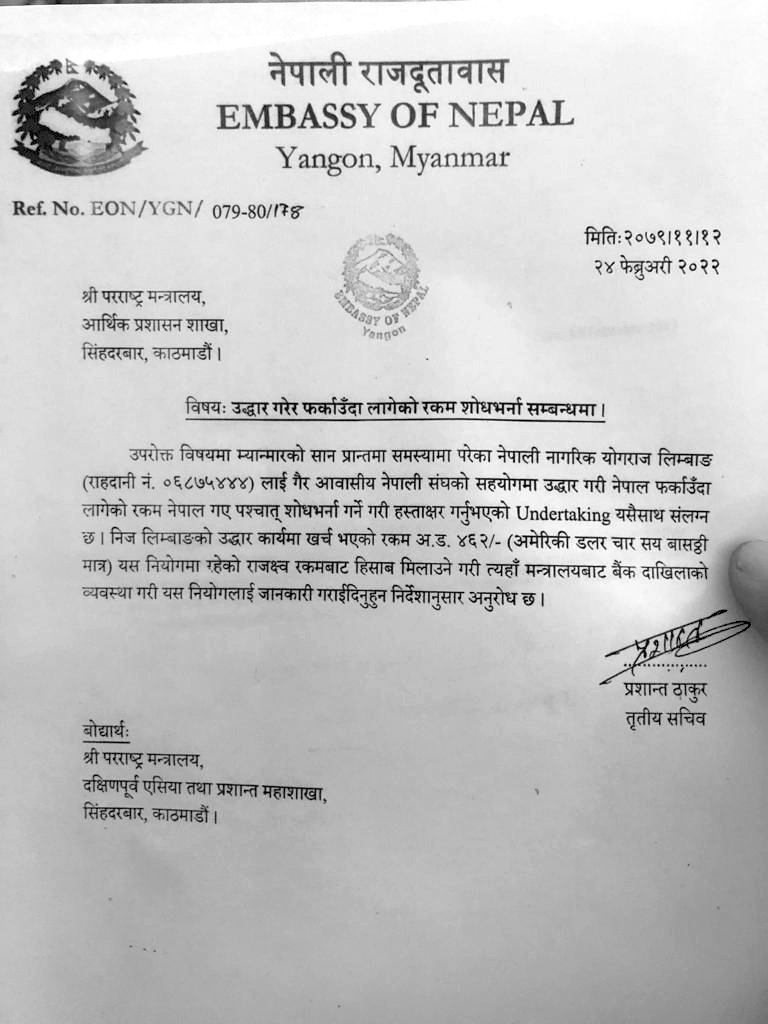
According to a Malaysian girl who escaped, 70 people are currently being held hostage in Maipong, near Wang Mangtam, and more young people are being taken to Myawaddy in Kayin and KK Garden in Shan province for cyber fraud. Yograj, who was part of the team that spoke with the Malaysian girl, stated that it is more difficult to escape from KK Garden, and that individuals who try to escape risk being shot at.
According to information obtained through telephone contact with locals, only Chinese currency is accepted in Wa State, not Burmese currency. A Nepali man surnamed Neupane who is living in Myanmar, requested that his full name not be published, said, "The United Wa State Army used to import weapons from China, but now they also manufacture their own guns."
In Kachin State, which borders China and is connected with Shan State, there exists another armed group known as the 'Kachin Independence Army'. It is regarded as a powerful rebel group operating in the area. Jitu Magar, a Burmese citizen who speaks Nepali and is associated with the same group, confirmed that while his army was not involved, crypto criminals were operating in areas controlled by other ethnic armies, threatening and harassing IT workers. Two years ago, Magar was enlisted in the rebel army by visiting Laiza Nagar, which is the stronghold of the Kachin rebel army after the coup by the national army. (See Conversation with Magar)
The Kachin Independence Army, which controls half of Myanmar's Kachin and Shan provinces, also has a Gurkha battalion comprising over a thousand Nepali speakers like Jitu Magar who resides in Myanmar. The rebel army is aware that local and Chinese hackers are operating a cybercrime enterprise in the states under its control.
No way out
Nepali Ambassador to Myanmar, Harishchandra Ghimire, stated that the number of people seeking assistance for rescue from companies engaged in cryptocurrency transactions in regions governed by armed rebels has been rising in recent times.
"Individuals have reported being lured to Myanmar under false pretenses of finding employment opportunities in Bangkok through online advertisements," shared Ambassador Ghimire. "We have been receiving distress emails from these individuals seeking assistance, with messages indicating groups of 50 people in one location, 10 in another, and five in yet another. Based on these emails, it is believed that at least 100 Nepali citizens have been victimised by such illegal activities."
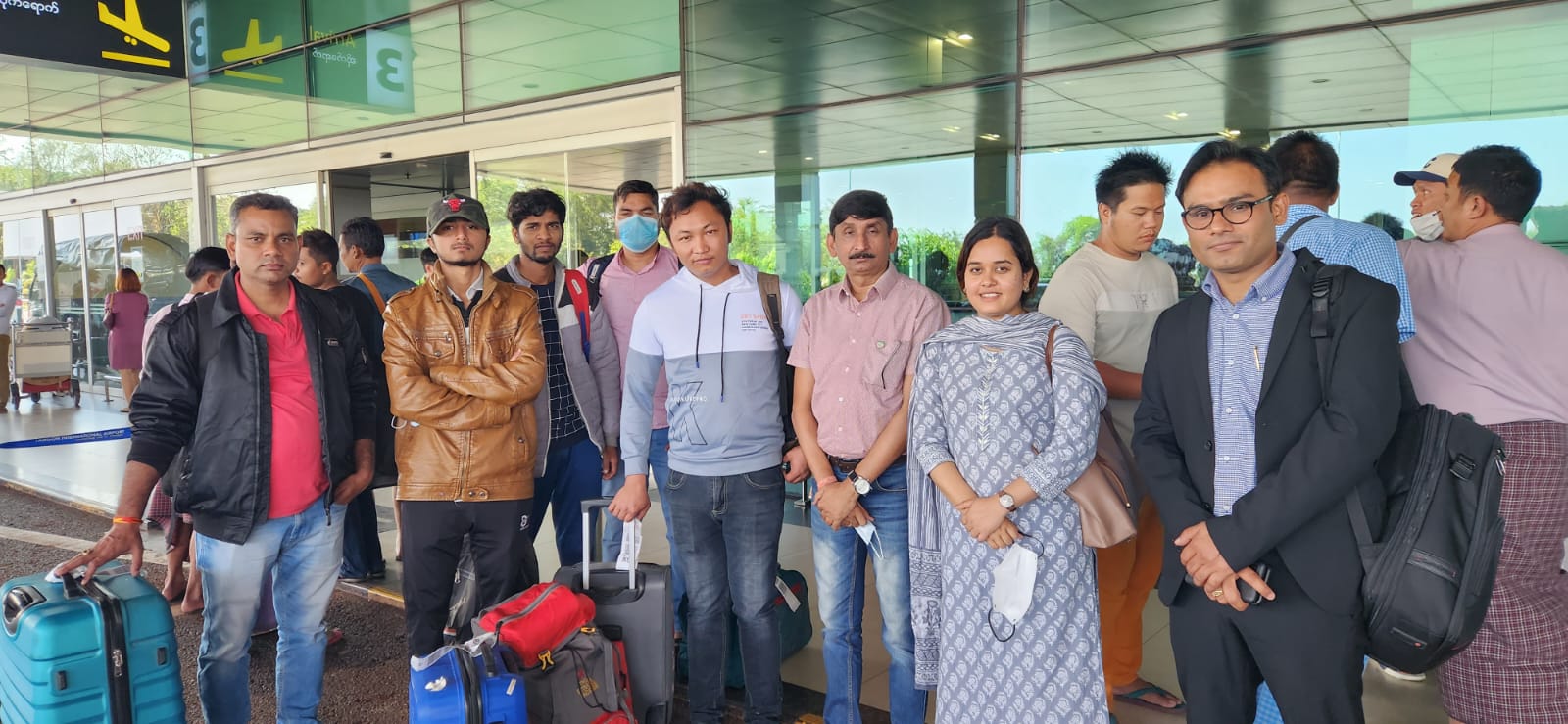
Despite the embassy's efforts to inform the Ministry of Foreign Affairs and other relevant agencies, no concrete action has been taken thus far. The Nepal Police's human trafficking investigation bureau has received a request to rescue 12 individuals who were deceived into working at a cryptocurrency company in Myanmar under the false promise of employment since January.
Jeevan Shrestha, the head of Nepal's human trafficking investigation bureau, stated that family members of two individuals have visited the bureau's office and others have submitted requests via email from Myawaddy in Kayin State, Myanmar, seeking assistance in rescuing their loved ones who were lured into working for a cryptocurrency company in Myanmar.
According to Shrestha, the head of the bureau, rescuing young people caught up in the cryptocurrency fraud industry is challenging because they willingly travel on visit visas for the promise of high-paying jobs. "We have notified the Police Headquarters and the Rescue Committee under the Home Ministry for further action. In addition, we have started to identify those involved in trafficking with the help of the victims," said Shrestha.
Rescuing Nepalese workers from a "crypto firm" located in a rebel-controlled area, which is not under the jurisdiction of Myanmar's federal government, is proving to be a challenging task. Embassy officials acknowledge the difficulties associated with rescuing the trapped Nepalese workers from such areas. "Those areas are entirely under the rebels' control. As a result, even the federal government is unable to take any action. Given that citizens of other nations are also employed there, we are consulting with other countries' ambassadors for assistance," stated Harishchandra Ghimire, the Nepali ambassador in Rangoon.
According to Ambassador Ghimire, despite meeting with Myanmar's Ministry of Home Affairs and Foreign Affairs and other relevant agencies, efforts to rescue the Nepali citizens trapped in the rebel-controlled areas have been futile. The authorities have responded by advising against traveling to such areas in the future.
The case of Yograj Liwang highlights that young people from various countries, including Nepal, are being trafficked to conflict-ridden areas of Myanmar under the guise of "lucrative jobs." Across the border regions of China, Thailand, and Laos, individuals posing as "IT workers" from different countries, including Nepal, have been abducted by Chinese "cyber hackers." These hostages are coerced into performing illegal activities without pay to avoid facing torture or death. Hackers running illicit online operations in secret have been known to physically assault their victims by handcuffing them if they are unable to work or seek rest.
Based on accounts from Nepali-speaking Burmese citizens who spoke with the Center for Investigative Journalism, most of the Nepali citizens who were taken as hostages are located in Myawaddy, Kayin state which borders Myanmar and Thailand, as well as in the Kachin and Shan provinces of Myanmar which border China and Laos. These areas are outside the control of the federal government, and it is believed that Nepalis are drawn to them in the hope of earning good money by working in illegal activities such as opium cultivation and gambling.
Jitu Magar, rebel combatant
Kachin Independence Army, Myanmar
The regions bordering China, Thailand, and Laos are notorious for being dominated by criminal organisations and gangs. These areas are known as "crime hotspots," and not all ethnic groups are able to access them. Ethnic forces in the area have established their own laws, and Chinese criminal groups have been involved in illicit activities in the China-Myanmar border area for several years.

The Kachin state may be considered relatively more stable and humane compared to other conflict-affected areas, but its proximity to China raises concerns. Although Chinese criminals are known to operate in the China-Myanmar border area, there have been reports of their presence in Kachin state as well. Furthermore, Myanmar is currently embroiled in a war with its federal government, making the situation even more precarious. It is advisable for Nepalis to avoid these regions to prevent the risk of getting trapped in such dangerous situations.
Yograj Liwang
I was born 29 years ago in Lalkhola, a small town in Ilam Municipality-8. My family's home is actually located in Shivsatasi-10 Sardare, Maidhar Jhapa, but my passport was issued using the address in Lalkhola.
I arrived in Dubai in February 2021 on a visit visa arranged by a relative from my village. Initially, I was hired as a warehouse helper for an electronic goods trading company named 'Safeline'. However, the job did not meet my expectations. Following this, I worked for six months as a beach resort employee at Lau Loa in Al Khan, Sharjah. My monthly salary was 850 dirhams. Subsequently, I began working at a coffee shop.
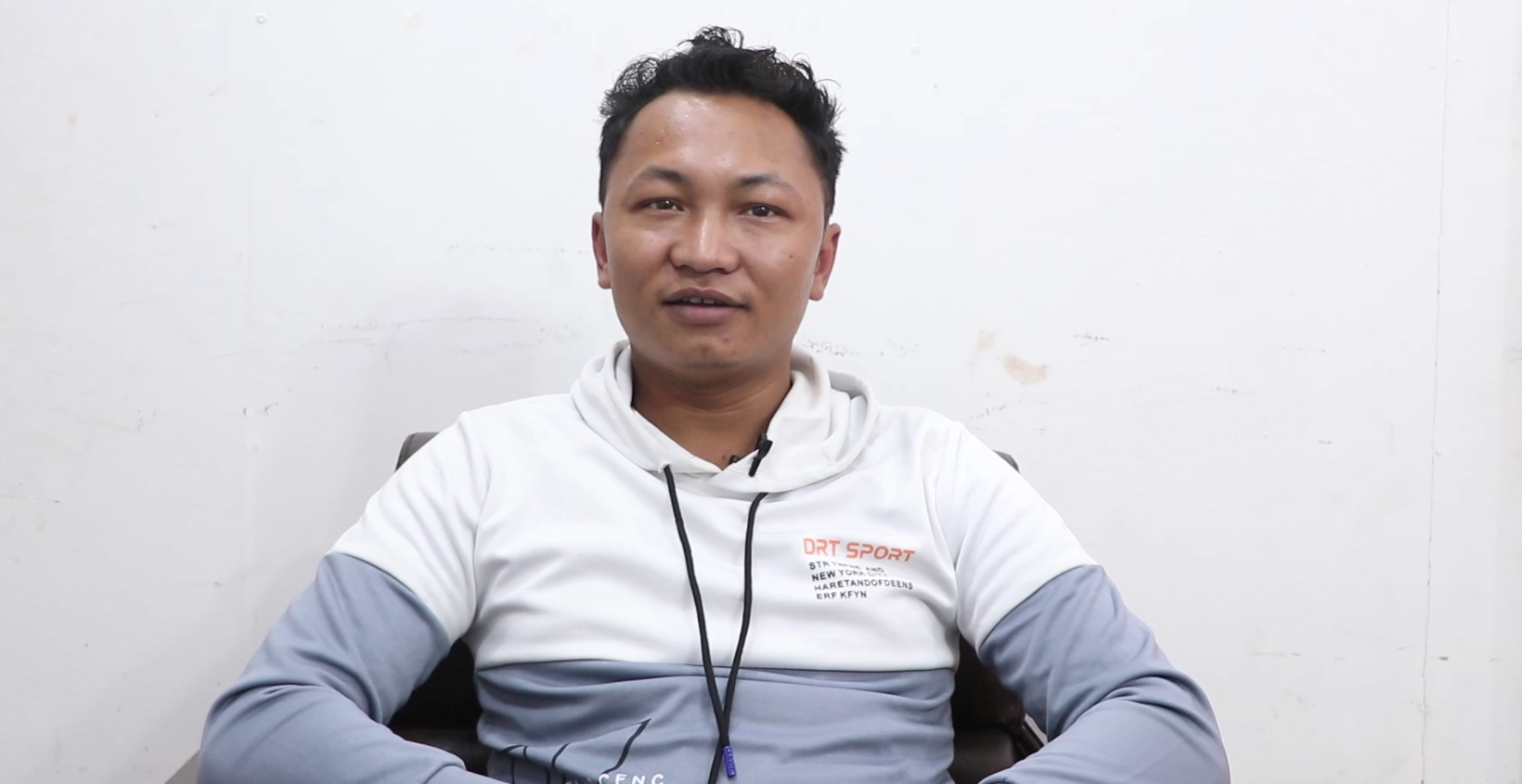
Upon my return, I lodged a complaint with the foreign employment department regarding my unfortunate experience in Qatar. Despite being promised a monthly salary of 1200 Qatari riyals along with food and accommodation, I was only paid 900 riyals and had to pay for my own food. I had to return to Nepal within three months due to the unfavorable working conditions. Although the department assured me that action was taken, I am yet to receive my investment of Rs 120,000.
In 2012, I ventured to Malaysia for foreign employment. In the state of Ipoh, specifically in a place called Perak, I worked as a waiter and bartender. The job went well, and I stayed there for a total of three years.
Upon my return to Nepal in 2015, I worked for six months at a canteen catering to workers involved in the construction of a building at Kathmandu University in Tripureshwor. Subsequently, I spent a year working at Hotel Lyco in New Bus Park, but did not find much success in my endeavors. As a result, I returned to Jhapa.
While residing in Jhapa, I pursued learning the Korean language and worked as a carpenter for a period. Later, upon the recommendation of a friend of my brother, Sahdev Baidya from Kathmandu, I journeyed to Banaras, India to work at a textile factory in 2017. However, I was coerced into engaging in a fraudulent scheme known as 'multilevel marketing' and was instructed to invest Rs 300,000 of my own money, which I did. Regrettably, it was a scam, and I ended up filing a complaint against Sahdev with the CIB in the beginning of 2018 after returning to Kathmandu. However, there was no progress made in addressing my complaint.
As someone who has encountered deceitful schemes while seeking work opportunities overseas, I am now considering a new destination outside of Nepal. Despite experiencing various fraudulent situations in the past, I feel that staying here will not lead to any significant progress. My brother and mother have already ventured abroad to countries like Kuwait, and I am left contemplating my own next steps. Having learned the Korean language, I am currently considering utilising this skill and pursuing employment opportunities abroad.
More Investigative Stories
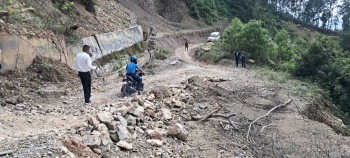
In Koshi Province, DPRs worth millions for projects never to be built
Many detailed project reports (DPRs) prepared by the Koshi provincial government at the cost of tens of millions are shelved....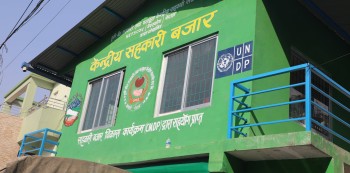
Uncooperative cooperatives
A Rs1 billion project aimed at promoting farmers failed due to mismanagement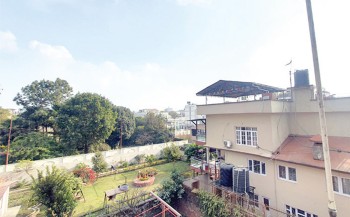

Comment Here